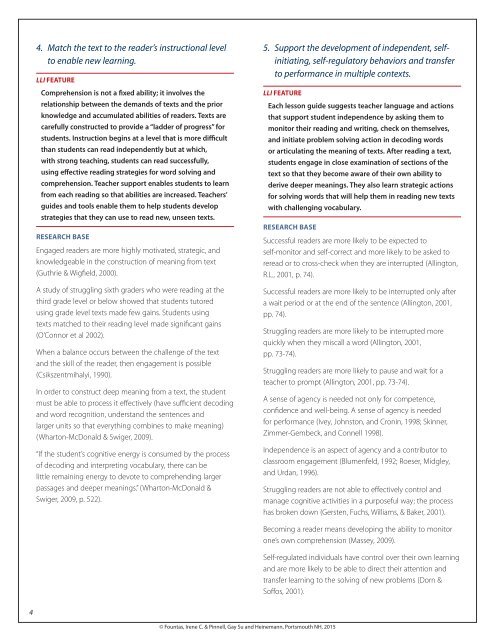Leveled Literacy Intervention
LLI_3_8_ResearchBase
LLI_3_8_ResearchBase
You also want an ePaper? Increase the reach of your titles
YUMPU automatically turns print PDFs into web optimized ePapers that Google loves.
4. Match the text to the reader’s instructional level<br />
to enable new learning.<br />
LLI FEATURE<br />
Comprehension is not a fixed ability; it involves the<br />
relationship between the demands of texts and the prior<br />
knowledge and accumulated abilities of readers. Texts are<br />
carefully constructed to provide a “ladder of progress” for<br />
students. Instruction begins at a level that is more difficult<br />
than students can read independently but at which,<br />
with strong teaching, students can read successfully,<br />
using effective reading strategies for word solving and<br />
comprehension. Teacher support enables students to learn<br />
from each reading so that abilities are increased. Teachers’<br />
guides and tools enable them to help students develop<br />
strategies that they can use to read new, unseen texts.<br />
RESEARCH BASE<br />
Engaged readers are more highly motivated, strategic, and<br />
knowledgeable in the construction of meaning from text<br />
(Guthrie & Wigfield, 2000).<br />
A study of struggling sixth graders who were reading at the<br />
third grade level or below showed that students tutored<br />
using grade level texts made few gains. Students using<br />
texts matched to their reading level made significant gains<br />
(O’Connor et al 2002).<br />
When a balance occurs between the challenge of the text<br />
and the skill of the reader, then engagement is possible<br />
(Csikszentmihalyi, 1990).<br />
In order to construct deep meaning from a text, the student<br />
must be able to process it effectively (have sufficient decoding<br />
and word recognition, understand the sentences and<br />
larger units so that everything combines to make meaning)<br />
(Wharton-McDonald & Swiger, 2009).<br />
“If the student’s cognitive energy is consumed by the process<br />
of decoding and interpreting vocabulary, there can be<br />
little remaining energy to devote to comprehending larger<br />
passages and deeper meanings.” (Wharton-McDonald &<br />
Swiger, 2009, p. 522).<br />
5. Support the development of independent, selfinitiating,<br />
self-regulatory behaviors and transfer<br />
to performance in multiple contexts.<br />
LLI FEATURE<br />
Each lesson guide suggests teacher language and actions<br />
that support student independence by asking them to<br />
monitor their reading and writing, check on themselves,<br />
and initiate problem solving action in decoding words<br />
or articulating the meaning of texts. After reading a text,<br />
students engage in close examination of sections of the<br />
text so that they become aware of their own ability to<br />
derive deeper meanings. They also learn strategic actions<br />
for solving words that will help them in reading new texts<br />
with challenging vocabulary.<br />
RESEARCH BASE<br />
Successful readers are more likely to be expected to<br />
self-monitor and self-correct and more likely to be asked to<br />
reread or to cross-check when they are interrupted (Allington,<br />
R.L., 2001, p. 74).<br />
Successful readers are more likely to be interrupted only after<br />
a wait period or at the end of the sentence (Allington, 2001,<br />
pp. 74).<br />
Struggling readers are more likely to be interrupted more<br />
quickly when they miscall a word (Allington, 2001,<br />
pp. 73-74).<br />
Struggling readers are more likely to pause and wait for a<br />
teacher to prompt (Allington, 2001, pp. 73-74).<br />
A sense of agency is needed not only for competence,<br />
confidence and well-being. A sense of agency is needed<br />
for performance (Ivey, Johnston, and Cronin, 1998; Skinner,<br />
Zimmer-Gembeck, and Connell 1998).<br />
Independence is an aspect of agency and a contributor to<br />
classroom engagement (Blumenfeld, 1992; Roeser, Midgley,<br />
and Urdan, 1996).<br />
Struggling readers are not able to effectively control and<br />
manage cognitive activities in a purposeful way; the process<br />
has broken down (Gersten, Fuchs, Williams, & Baker, 2001).<br />
Becoming a reader means developing the ability to monitor<br />
one’s own comprehension (Massey, 2009).<br />
Self-regulated individuals have control over their own learning<br />
and are more likely to be able to direct their attention and<br />
transfer learning to the solving of new problems (Dorn &<br />
Soffos, 2001).<br />
4<br />
© Fountas, Irene C. & Pinnell, Gay Su and Heinemann, Portsmouth NH, 2015


